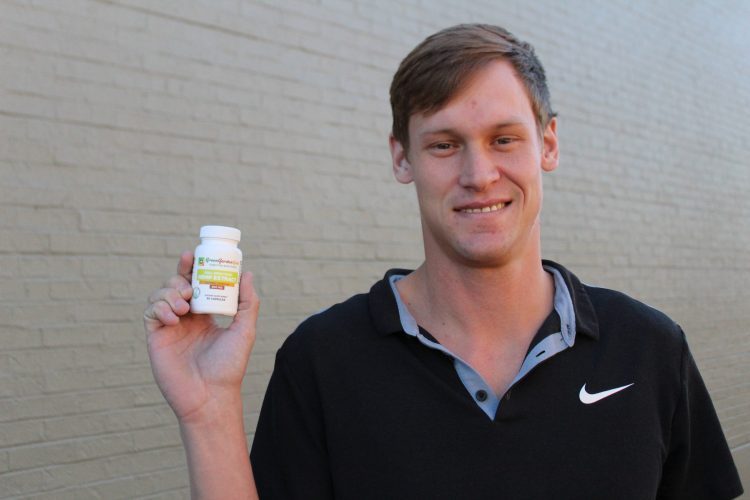By Dr. Dank
Dope Columnist

Cole McCullough, a former Brookhaven College student, holds a bottle of hemp extract, which has helped him control the tics caused by his Tourette diagnosis.
One in 360 children 6-17 years old have been diagnosed with Tourette syndrome in the U.S., with boys affected three to five times more than girls, according to the Centers for Disease Control and Prevention.
Those diagnosed suffer from two types of uncontrollable tics – motor, vocal or both – according to the CDC. Vocal tics can include clearing of the throat or uttering a word or phrase. Motor tics are involuntary movements of the body, such as blinking, shrugging or jerking.
These tics can have a mild effect or can cause extreme discomfort for those diagnosed.
SYMPTOMS
Cole McCullough, a former Brookhaven College student, said he remembers when his motor tics became noticeable.
“I was taking a spelling test when I was in third grade and I realized my wrist was hurting,” McCullough said. He popped his right wrist and could not write. To help ease the pain, McCullough’s dad wrapped his arm with an elastic bandage.
Wrapping his wrist was a quick fix at the time, but the discomfort returned the following year. It spread to his shoulders and then his hips, he said. “[The discomfort was] in all my joints,” McCullough said. “I’d have to pop my joints out of the socket, so it was very, very painful.”
There is no cure for Tourette syndrome, only treatments that subdue the effects, according to the CDC.
FEEBLE TREATMENTS
McCullough said he was first prescribed antipsychotics and antidepressants. “Medications I really didn’t need to be taking, but some of the secondary conditions that they would treat were motor tics,” he said.
By 2015, McCullough’s motor tics got so bad he opted to paralyze parts of his body to stop the constant jerking. He said he needed to do something drastic.
McCullough took 60 units of botulinum toxin, or botox, to stop his erratic movements. Doctors injected botox into the base of his skull, spine, back and shoulders. Simple tasks, such as brushing his teeth and bending over to tie his shoes were difficult to do after the treatment. “I couldn’t lift my arms to shoulder height,” he said.
McCullough said, “There is no one medicine for motor tics or tics in general, so that’s why they treat it with a multitude of different medications.
According to the Tourette Association of America, Dr. Katie Kompoliti said using botox to treat the motor tics of Tourette syndrome has proven useful. However, botox does not completely eliminate tics, she said.
NATURAL CURE
Recent studies have shown that cannabidiol, or CBD, yields positive results in treating motor tics. “Researchers know that cannabinoid receptors are located in the basal ganglia and hippocampus, areas of the brain that are responsible for regulating movement and behavior,” according to echoconnection.org, a website that provides therapeutic medication alternatives.
For McCullough, discovering CBD brought relief he had not felt since his diagnosis. Trying a CBD patch in Colorado relieved his tics to the point his condition became temporarily unnoticeable. He did not realize CBD was soothing his body’s ailment, he said.
According to High Times, “Cannabinoids ‘modulate neuronal excitability’ and act as retrograde signal inhibitors.”
CBD AMBASSADORS
It was not until he began working at Green Garden Gold that he noticed a decline in his tics. According to its website, the company produces high-quality hemp oil containing CBD.
He tested the products he would soon begin selling. After trying two gummies with 32 milligrams of CBD a piece, it all clicked.
“Three days in a row I just did not tic,” McCullough said. “It was the first time in my life since basically third grade. … I felt like a blind man who could see for three days.”
McCullough now takes CBD capsules daily to manage his tics. “I feel normal,” he said.
“CBD is a molecule that’s an extract out of the cannabis genus family, for us specifically it is a derivative of the hemp plant,” Justin Barrick, president and CEO of Green Garden Gold, said. “That’s what allows it to be legal in the state of Texas.”
TEXAS LEGAL WEED
According to the Texas Department of Public Safety, Senate Bill 399, also known as the Texas Compassionate Use Act, requires DPS to create a secure registry of physicians who prescribe low-tetrahydrocannabinol cannabis, or low-THC. The bill also requires DPS to license at least three dispensing companies should they meet requirements. “The license authorizes the organizations to cultivate, process and dispense low-THC cannabis to prescribed patients,” according to DPS.
Only epilepsy patients for whom two FDA-approved drugs have failed may be prescribed marijuana, according to the bill. While hemp is a part of the cannabis family, it does not contain considerable amounts of THC, the cannabinoid associated with euphoric experiences. This makes it legal to derive the CBD from hemp.
“A lot of people don’t give [medicinal cannabis] a chance to be completely medicine because we’re still fighting the stigma,” McCullough said. “If more people, or even physicians, would get off the pharmaceutical train and pushing these drugs onto people and then maybe go in the holistic route, like what CBD is, more of the natural way, then I think more people would understand the benefits of it.”
McCullough said, “People like me need to be out there … to be the substance ambassador and be like, ‘Hey, this stuff isn’t snake oil, it’s the real deal.”’






